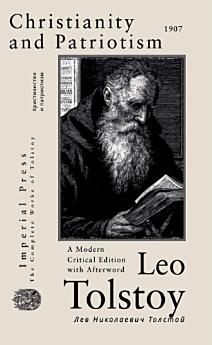Christianity and Patriotism
About this ebook
"Christianity and Patriotism," known in Russian as "Христианство и патриотизм," was written in 1894 and published in 1900. This work, sometimes known by its German title "Christentum und Patriotismus," directly addresses the incompatibility of patriotic fervor with Christian principles of love, compassion, and non-violence. Tolstoy argues that governments exploit patriotic sentiment to wage wars, and that the Church, by supporting such governmental policies, deviates from its core Christian message. He contends that loyalty to one's nation should not supersede universal moral and ethical principles, drawing upon biblical teachings to support his stance. The essay also highlights how various societal figures, including journalists, merchants, writers, and even emperors, benefit from the promotion of patriotism, which he views as a tool for perpetuating conflict.
The work presents a critique of state violence and militarism, asserting that genuine Christianity undermines governmental foundations from within, rather than through external revolutionary action. Tolstoy refutes arguments that attempt to justify violence within a Christian framework, emphasizing that individuals with families and homes naturally desire peace and abhor war, wishing only to avoid inflicting harm upon others. This essay aligns with Tolstoy's later philosophical and political views, particularly his anti-war stance and his critique of state authority. Its ideas on nonviolent resistance influenced figures such as Mohandas Gandhi, who saw in Tolstoy's vision a practical path for nationwide nonviolent movements.
This critical reader's edition presents a modern translation of the original manuscript, crafted for the modern reader with clean, contemporary language and simplified sentence structures that clarify his complex Russian phrasing and specific antiquated references. Supplementary material enriches the text with autobiographical, historical, and linguistic context, including an afterword by the translator on Tolstoy’s personal history, impact, and intellectual legacy, an index of the philosophical concepts he employs—emphasizing Existentialism and influence by Schopenhauer—a comprehensive chronological list of his published writings, and a detailed timeline of his life, highlighting the personal relationships that shaped his philosophy.











